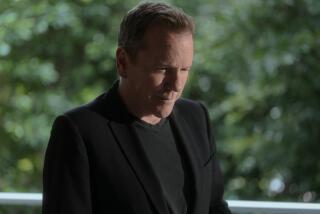Want Creepy? Brian Cox Is the Go-To Guy
In âL.I.E.,â Brian Cox plays a pedophile. The 55-year-old Scottish actor has also portrayed a cannibal (Hannibal Lecter in the 1986 film âManhunterâ) and a Nazi (Hermann Goering in TNTâs 2000 cable miniseries âNurembergâ). But a child molester? Even the most open-minded actor would surely pause before considering such a role.
âI find the film difficult to watch,â admits Cox, the father of two grown children. âIt becomes very unsettling, but ultimately itâs a very rewarding film.â
Rewarding, says Cox, because âL.I.E.â treats its subject matter in a non-exploitative manner. âIf a film is responsible, like when I saw Todd Solondzâs âHappiness,â you go, âThis is true, this is not sensational.â âL.I.E.â is not judging, in the wrong way, but at the same time it doesnât let the guy off the hook. Itâs not a fetish film or sensation for sensationâs sake. âL.I.E.â takes you on a journey that [asks the audience]: How do you feel, how do you feel about these things? Itâs ambiguous. People get caught up in it. They genuinely think, this is horrendous.â
âL.I.Eâ could have been even more disturbing: Coxâs Big John Harrigan character likes teenage boys, not younger children. For Cox, thatâs an important distinction. âItâs not about sex with children, which I would have a real problem with,â he says. âIf you look at films like âLolita,â which is about guys getting off on teenage girls--thatâs not particularly acceptable either, but âL.I.E.â is a similar thing to that.â
Set in a suburb intersected by the Long Island Expressway (L.I.E.), the story revolves around an aimless 15-year-old, Howie (Paul Franklin Dano), whom Vietnam vet Big John tries to seduce. Over the course of a long, hot summer, John eventually becomes a kind of surrogate father to the restless teenager. Directed and co-written by Michael Cuesta, the NC-17-rated movie from Lot 47 Films opened Friday in Los Angeles.
Acquaintances tried to warn Cox off the project, the actor recalls. âPeople said, âYouâre not going to do yourself any favors by taking a part like this.â Look, Iâm an actor, for 40 years. I think Iâm reasonably good at what I do. I think the range of my work speaks for itself.â
Indeed, since filming âL.I.E.â last summer, Cox has moved on from suburban pederast to Supreme Court justice--heâll play a judge in ABCâs midseason drama âThe Court,â starring Sally Field. Cox also appears in the upcoming comedy âSuper Trooper,â the romantic period adventure âAffair of the Necklaceâ and the spy thriller âThe Bourne Identity.â
The burly actor recently brunched on eggs Benedict at a West Hollywood restaurant, where he talked about getting inside the head of such an extreme character.
What was his preparation? âI do very little,â Cox says. âI donât buy all this identification with roles. All these actors who submerge themselves in roles, basically, theyâre covering up for a lack of talent, a lack of real craft.â
Cox notes that his own chaotic childhood primed him psychologically for life as an actor. His father died when he was 9. His mother suffered a nervous breakdown and was institutionalized. Young Cox was sent to live with his aunt. He taught himself to read by poring over the record labels on his sisterâs collection of 78s.
âItâs not something I recommend,â muses Cox. âBut as a kid, if your world is taken away from you, there ainât nothinâ you can do about it, because you have no power. Itâs a very good way of training yourself as an actor. You have an entry into the world as an unsteady place. What it does is give you insight, when youâre very young, about how the world truly is, and it forces you to develop the survival mechanism needed.â
Coxâs astonishing facility for slipping in and out of roles--heâs made more than 60 films so far, along with countless stage roles--can be credited to his training in Englandâs repertory theater system. When Cox came of age professionally, there was simply no time to inhabit a character âround the clock.
âIn those days, they used to do fortnightly rep,â says Cox. âTheyâd change the play every two weeks. Iâd get to watch actors like Glenda Jackson and Nicol Williamson do their work, change their hats, and in a year, they might do as many as 20 roles. They didnât play it with any less commitment, but considerably more in many ways, because with all that variety you have to keep the brainpower going, the learning capacity. In a way, what you had to do growing up in the theater was, you had to prove your worth all the time.â
For Cox, that meant exploring the Shakespeare canon opposite actors like Albert Finney and Ian McKellen, winning two Olivier Awards (the British equivalent of the Tony Awards) along the way. Says Cox, âI had to struggle throughout to prove [my] classical muscle. You have to take on the classical theater, beat it, and then walk away.â
Coxâs breakthrough American film role came in the pre-Anthony Hopkins incarnation of Hannibal Lecter in Michael Mannâs âManhunter.â Dozens of villainous roles followed. At one point, Cox grew weary of playing the bad guy. But then a performance as King Lear at a British hospital for the criminally insane reminded him why actors need to embody even the most heinous aspects of human nature.
âMany in the audience had killed their parents,â he says. âWeâre performing the play for these people, and Learâs in the hovel, out from the storm, soaking, got no clothes on, his daughters have rejected him, and heâs got this line, âIs there any cause in nature for these hard hearts?â And this young woman in the front row, who hadnât spoken in years, went, âNo, no, no, no cause, no cause.â At a moment like that, you go, âGod, this is such an amazing job.â
âYou had the feeling that you were part of some kind of ritual, where itâs almost like you take on peopleâs sins on their behalf; thereâs a sort of exorcising that goes on. You suddenly realize what youâre dealing with, how precious the material is, how precious the whole subject of humanity is.â
Michael Cuesta, a first-time director, spoke to a few other actors before recruiting Cox for âL.I.E.â âThe problem some people had was not playing a dirty old man but the fact that youâre stretching a taboo,â he notes. âTheyâd say, âCome on, this guy, heâs not sympathetic. The audience is never gonna buy that.â I guess thatâs where the controversy lies, the fact that this character has a moment of humanity and decency.â
Cuesta counted on Cox to make Big John more than a mere monster. âThe menacing part, I knew Brian could do,â says Cuesta. âWhen I met him, I wasnât searching for that; I was searching for the humanity. Brian brings this sort of affable, chummy, jovial quality to the role, and thatâs what, I think, bothers people, is that they like him. Heâs creepy when he has to be creepy, but when heâs cooking breakfast, you canât help but love the guy.â
It all comes down to point of view, says Cox. âWhen you come to playing characters like Goering, or Big John, you think, well, these are people who started off with all kinds of aspirations and it all went wrong and they ended on the wrong side. So that is a fascinating challenge to play: the human being whoâs gone off the mark.â
To make such a character palpable, Cox adds, âitâs not just saying the lines; itâs where the guyâs coming from, itâs the guyâs point of view.â In the case of âL.I.E.,â Cox found the virtue in his villain by investing Big John with nurturing instincts.
âHe wants to be a father but his sex thing gets in the way, because heâs ruled by his libido. But his real desire is to be a padrone, a father. Itâs an interesting dilemma,â says Cox. âHereâs a man whoâs a sexual predator of young men, when actually his desire is to be an enabler, to make someone blossom, to make someone grow.â
As a point of reference, Cox, who has taught drama at Harvard University and the London Academy of Music and Dramatic Art, says, âYou get young girls who have crushes on you; it would be so easy to take advantage of them. But you go, âNo, this is a relationship which is about her ability and therefore I canât cross the line.â Now, John had never been able to do that. And suddenly heâs put in a position where, for once, he doesnât cross the line. Thatâs the redemptive nature of the thing. And this is what I look for all the time.â
That is, unless the character is a hero. Then Cox, ever the contrarian, looks for the dark streak. âYou get actors who say, âI want to play heroes. I want to be identified with heroes.ââ Cox pauses. âIf I played heroes, Iâd want to see where they were rotten, you know. Because most heroes have a kind of canker in them. Thatâs why theyâre heroic.â *
More to Read
Only good movies
Get the Indie Focus newsletter, Mark Olsen's weekly guide to the world of cinema.
You may occasionally receive promotional content from the Los Angeles Times.










